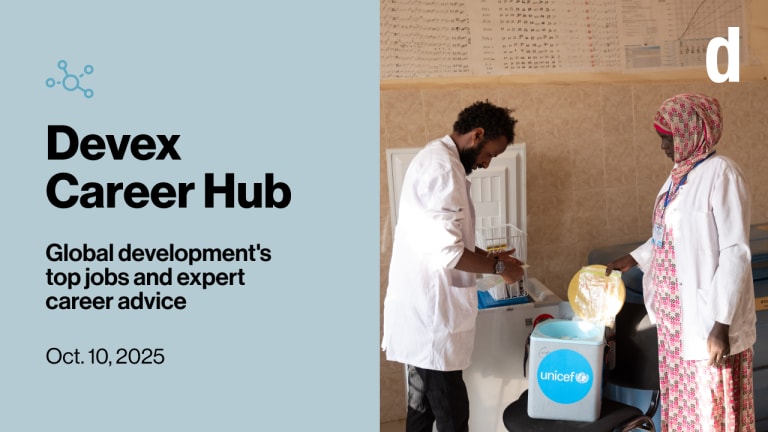Opinion: What we know about global development's wage gap

The following story was shared anonymously by a mid-career woman who tried, unsuccessfully, to close the wage gap between she and her male colleague. Keep reading for analysis on how to equalize salaries in your organization by Quantum Impact. This story is featured as part of the ongoing Women Working in Global Development campaign, a partnership between Devex and Quantum Impact.
The story: An unsuccessful attempt at salary parity
In the earlier part of my career, I knew there was a gender bias in setting salary, but I was never someone who was going to complain or ask for more money. When I did switch jobs, I received a salary bump, but because of my 1420 biodata form that captured and documented all of my earlier salary biases, I was still underpaid relative to my experience and my position.
In my most recent position, the head of the project team was male and there were four of us reporting to him; three technical advisors who were women, and one senior technical advisor who was a man. The three women technical advisors were all being paid less than the male technical advisor, even though we had significantly more experience than him in terms of years.
At first I didn’t think anything of the huge salary discrepancy, but after a year it was clear he was not providing the kind of value to the project commensurate with what he was being paid. He couldn’t write, manage, or do business development very well. Yet, here I was doing all of that and being paid 8 percent less for essentially the same job. My female colleagues, who had a few years less experience than me but still more than our male co-worker, were being paid 20 percent less than him.
I finally felt I had enough data to bring up the issue to HR. They did a salary review of the entire unit, which they said showed that I was being paid equitably. They advised me to look at the job description for the senior technical advisor position, one level up from mine, and write why I was qualified for that position in order to convince my supervisor to give me a salary bump. I did that and sent it to my boss. His response to me was that he saw me and the male co-worker as “apples and oranges.” To which I responded, “If my 10 apples are equivalent to his 10 oranges, shouldn’t we be paid the same?” He had no answer to that. He was furious that I’d found out what my co-worker’s salary was and made it the reason to ask for a raise. Nine months later he asked me to take on more business development work. I was not interested, because it was obvious he wanted to give me new responsibilities to justify the increase in salary that I had requested and already felt was justified.
Nothing changed for the next year. The only salary increase I received was an adjustment for cost of living. At that point, I was fed up with the job and the entire contracting business. HR said they talked to my supervisor and he wasn’t interested in budging. When I quit, two other women on my team quit, and all complained to HR that there was gender bias. That same supervisor is still there.
My advice to other women: Whenever starting a new job or getting a promotion, never take the lower salary, always fight for more. Constantly keep notes about why you deserve an increase, what you’re worth. Your male equivalent will have those notes. On my team, I’ve seen men who weren’t doing very much come to me for salary increases, and women who were going above and beyond not even think to ask for increases or promotions. I used to keep meticulous notes about what I did and why I deserved increases, that was the only way to “get to yes.”
Quantum’s take: What we know about women’s compensation in global development
Little data is available about relative compensation of women in the international development workforce. We know that in general women in the U.S. earn 83 percent of what men earn. We also know that women with kids are systematically passed up for promotions and career opportunities. Economists have found that in the U.S. having one child reduces a woman’s earnings by roughly 6 percent; having two depresses them by 15 percent. By contrast, fatherhood spurs men to work around 80 more hours a year, on average, which bumps up men’s earnings by around 6 percent. We also know that the highest-paying jobs disproportionately reward those who can work the longest, least flexible hours. These types of job penalize women, who usually have more caregiving responsibilities outside the workplace.
What all of this means is that the wage gap actually increases over the course of a woman’s career — it may look harmless in her 20s, but it gets larger in her 30s and 40s. A study of graduates of top business schools found that, although male and female MBAs have nearly identical earnings at the outset of their careers, their earnings diverged, with men earning almost 60 percent more than women a decade after MBA completion. Professions such as law, finance, tech, consulting, etc. that encourage working longer hours generally have larger wage gaps, while others like pharmacy, logistics, or teaching have smaller ones.
More research is necessary to understand what the relative wage gap is for men and women in the international development sector, but it is likely to be quite substantial given the working hours, travel requirements, and stressful conditions that are generally present challenging and pressure mothers to spend time away from their families.
We also must seek to understand the nuances of the wage gap to fix the problem. For example, women’s aversion to negotiating for higher salaries has long been considered a major factor in the gender pay gap. Considerable research shows that women are more likely than men to believe that salary is not negotiable in their workplace; men, on the other hand, are more likely to directly ask for a raise. Other studies have shown that when women do ask for raises, they are less likely to receive these raises than their male counterparts. Over time, this disparity compounds. Not negotiating for a 5 percent increase when making $40 thousand, may seem inconsequential, but imagine what this difference looks like over time?

The fix: What can managers and HR leaders do?
An organization looking to equalize salaries needs to start by closing the wage gap, and then determining the root cause to prevent it from repeating. Engaging a representative task force to assess the problem enables staff with diverse skills and perspectives to contribute to the outcomes. Once the task forces identifies the internal factors causing the discrepancy, leadership can decide which interventions are necessary to address the causes. For example, it is not advisable (and in a growing number of states, illegal) to use a candidate’s past salary to determine what salary to offer. Former Reddit CEO Ellen Pao eliminated salary negotiations at Reddit in order to help her female employees achieve salary parity with men. Other organizations train employees to negotiate, for example by framing their “ask” in terms of benefits to their counterparts, team, or organization.
At any organization, key to achieving parity is building an inclusive culture over time that encourages staff to feel comfortable with who they are in the workplace.
Yes, closing the wage gap will take a lot of planning and patience, but it is completely possible. Are you ready?
This story is featured as part of the ongoing Women Working in Global Development series, through a partnership between Devex and Quantum Impact. Would you like to submit a story about overcoming adversity in your career that could help other women? Click here.
Search for articles
Most Read
- 1
- 2
- 3
- 4
- 5









